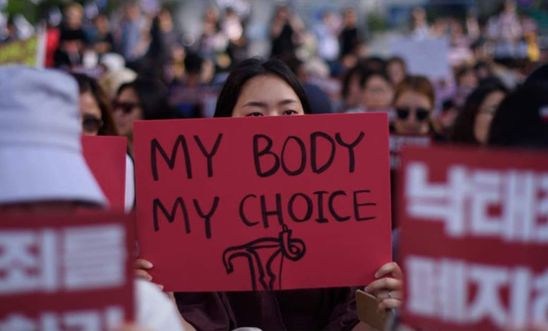With the awakening of feminist awareness around the world, and especially in Taiwan, people are putting more and more effort on reaching improved levels of gender equality.
So much so, that Taiwan recently ranked ninth in data used in the United Nations Gender Inequality Index earlier in the year – the best in Asia.
However, in Taiwan, there also seems to be a throwback in the mindset of many that female rights to some degree should be restricted.
According to (the) Enforcement Rules of Genetic Health Act, it is legal in Taiwan to receive artificial abortion within the first 24 weeks of pregnancy; but some abortions are carried out after this time based on the judgments of medical professionals.

Not everyone agrees this should be the case.
Peng Chia-Chi, the chairman of Taiwan’s United Action Alliance, addressed a proposal regarding stricter restraints on abortion.
Peng said that abortion should be performed only within the first eight weeks following conception to guard against infringing upon an infant’s right to life.
On a referendum hearing on the issue in late October, 2019, Chairman Peng even accused Taiwanese society of being indifferent to this brutal action, with an inappropriate comparison linking abortion to a form of animal abuse.
“How come we show sympathy towards ill-treated pets, but in the meantime, put up with killing babies?” Peng asked.
The general secretary of the Taiwan Association of Obstetrics and Gynecology, Huang Min-Chao indicated that between 5% and 35% of women have irregular menstruation, which might delay any confirmation of pregnancy, and thus mean they are not able to abort if they miss the eight-week timeframe.
She also mentioned that a minority of pregnancies that include victims of rape and unmarried women might require more time to give appropriate consideration as to whether or not to resort to medical assistance in this manner.
“A sharp reduction (in the current law) to (enact abortions prior to) eight weeks strangles a woman’s physical autonomy.” said Huang.
In fact, examinations for Down’s syndrome, and any other congenital disease can only be conducted 16 weeks after conception.
In other words, women would not be allowed to give up on embryos even knowing that they are innately defective under this proposal.
Failing to pass the referendum last year, the United Action Alliance promoted another plebiscite, the “Six-day Contemplation before Artificial Abortion”, in early 2020.
Peng condemned the Genetic Health Act consenting to any abortion, and appealed to the public that our government should actively and forcibly recruit medical personnel and social welfare units to co-arrange counsel in the hope of encouraging women to maintain pregnancy, and not to terminate.
“Ever since the implementation of (the) Genetic Health Act, there has been a dramatic decline in fertility, which thereafter brought about demographic structural problems in our society” said Peng.
This argument unintentionally showed that a patriarchy still drives some people to blame low fertility rates on a woman’s decision to turn to abortion, and thus oversimplifies the reasoning behind such decisions as lacking in responsibility, depth of consideration, and the proper knowledge required to decide thus.
(The) “law is here to improve society, not to deepen the prejudice against the vulnerable.” said Lawyer Li Chuan-Ho in response.







Comments are closed.